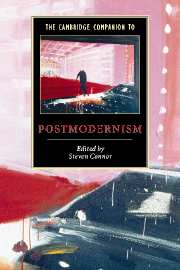Book contents
- Frontmatter
- Introduction
- 1 Postmodernism and philosophy
- 2 Postmodernism and film
- 3 Postmodernism and literature
- 4 Postmodernism and art
- 5 Postmodernism and performance
- 6 Postmodernism and space
- 7 Science, technology, and postmodernism
- 8 Postmodernism and post-religion
- 9 Postmodernism and ethics against the metaphysics of comprehension
- 10 Law and justice in postmodernity
- Further reading
- Index
- Sereis List
7 - Science, technology, and postmodernism
Published online by Cambridge University Press: 28 May 2006
- Frontmatter
- Introduction
- 1 Postmodernism and philosophy
- 2 Postmodernism and film
- 3 Postmodernism and literature
- 4 Postmodernism and art
- 5 Postmodernism and performance
- 6 Postmodernism and space
- 7 Science, technology, and postmodernism
- 8 Postmodernism and post-religion
- 9 Postmodernism and ethics against the metaphysics of comprehension
- 10 Law and justice in postmodernity
- Further reading
- Index
- Sereis List
Summary
Postmodernism and the legacy of the enlightenment
Between the 1970s and the late 1990s, the concept of the “postmodern” was associated with a wide range of different meanings. It could designate a chronological period, a particular style found in some contemporary artworks and literary texts, a property of social structures at the end of the twentieth century, a change in the values of certain societies, or a specific way of thinking theoretically about such issues as language, knowledge, or identity. Different interpretations of these basic meanings further add to the complexity. Understood as an historical period, the postmodern could either follow a modernity defined by political, social, cultural, and economic institutions that had emerged in the late eighteenth century, or succeed the cultural and artistic modernism that had characterized the era from approximately the 1850s to World War II. Viewed as an aesthetic style, the postmodern could refer to quite different features depending on whether it was studied in an old historical art form such as architecture, which had developed a distinctive “modern” style beforehand, or a very young art form such as film, which had evolved only during the modernist period. Some of this terminological ambivalence also attaches to the relationship between science, technology, and postmodernism. On the one hand, one can designate as “postmodern” some of the latest scientific and technological achievements, particularly those that are culturally perceived as ushering in a different historical era and type of society. On the other hand, scientific knowledge and technological rationality have been seriously challenged by postmodern modes of thought that more generally question fundamental Enlightenment assumptions about human subjectivity, knowledge, and progress.
- Type
- Chapter
- Information
- The Cambridge Companion to Postmodernism , pp. 136 - 167Publisher: Cambridge University PressPrint publication year: 2004
- 11
- Cited by



